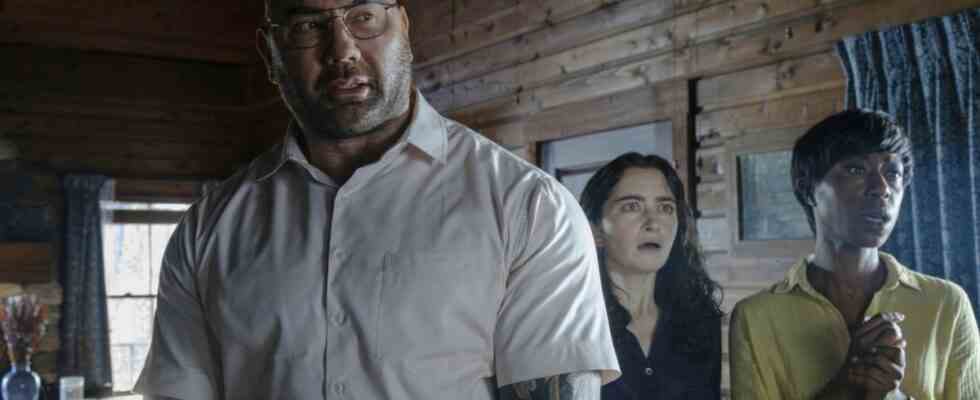A lonely cabin, by a lake in a forest in Pennsylvania. A secluded but thoroughly cultivated domicile, the wall of books is well stocked. “The Cabin at the End of the World” is the name of Paul Tremblay’s novel, which M. Night Shyamalan adapted into his new film “Knock at the Cabin”. The end of the world is not meant topographically, not as an indication of the remoteness of the place, but it indicates the time when the book takes place – precisely when the end of the world is in full swing, catastrophe follows catastrophe and the question it becomes clear whether and how everything could still be averted.
A young family is vacationing in a cabin in the woods. Andrew and Eric, a gay couple, and their adopted seven-year-old daughter Wen – with that naive, somewhat annoying joy that city people throw themselves into nature with. The girl is roaming through the sunny forest when suddenly Leonard appears in front of her, they start talking and exchange experiences on catching grasshoppers. He’s a teacher, says Leonard, with simple-frame glasses and huge tattooed arms, because it’s ex-wrestler Dave Bautista who plays him.
Three more figures appear behind Leonard, all of whom have archaic equipment with them – not weapons, Leonard explains, but tools for their common mission, the most important job in the world. All four of you had the same mystical vision, independently of each other, what the end and salvation of the world was all about. This should now be made clear to the three vacationers with fanatical urgency.
The fanatics force their way in, but insist on being voluntary
They first barricade themselves in their hut – a place of retreat for them anyway, in flashbacks there are unpleasant experiences that the homosexual couple had to make with their parents or at the adoption office. Of course, Leonard and his comrades quickly gain entry by force. It’s a classic thriller beginning, genre Home Invasion: evil people or demons invading a home for base or mystical motives.
Here, however, the elements are quickly shaken up and led to absurdity, as one would expect from director M. Night Shyamalan. The young fathers are tied up, but then asked, with pedagogical fury, to go inward – because everything depends on them. Only if one of them sacrifices himself voluntarily and accepts death can the world be saved. You know this somewhat measly blackmailing logic from the story of the victims of Abraham and Isaac – Shyamalan’s films were always based on the Bible. Nevertheless, it all sounds very ludicrous, unreal, absurd.
Paul Tremblay’s novel was a huge hit in America and was very well received by critics. The film adaptation has, at long last, ousted James Cameron’s second “Avatar” film from the top of the box office in America, but compared to other Shyamalan films – his biggest success was his third film, “The Sixth Sense”, 1999, with Bruce Willis – performed rather averagely.
For the ending of Tremblay’s story, Shyamalan has developed a whole new vision, less somber and radical, the screenwriters said at the US premiere Steve Desmond and Michael Sherman the industry journal Variety. “This was supposed to be a big film with wide distribution ratings, intended for a very large audience. There are some things the book did that would have been pretty dark and a little too much for a general audience. Shyamalan recognized that immediately.”
Loneliest locations, but global catastrophes – that’s Shyamalan’s trick
Leonard and the other three rescue visionaries are a motley crew, including a nurse and a cook and an uncontrolled redneck, played by Rupert Grint, the “Harry Potter” co-star. The apocalypse is in progress, images of it flood into the hut via television, tsunamis slap the beach and planes plop down from the sky like dead birds.
One home invasion has unleashed legendary American primal powers in genre cinema since Wes Craven or Bruce Willis, in the men and women who are attacked, they are slowed down here by a trick that is as ingenious as it is simple-minded – it must be an absolutely free decision, with which one in the hut opens the door to death takes, no violence, no psychological pressure. To demonstrate the importance of their mission, the invaders resort to a terrifying, absurd device…
It has always been Shyamalan’s trick, connecting the loneliest of locations – a cornfield in the vast plains of the United States, a village locked in the past – with world and universe-wide disasters. How the horror in this film might be related to the three well-behaved, terribly average shack dwellers leaves an ominous metaphysical void. Is there a god behind this test arrangement? One with sarcasm and a desire to play? Is there a hint of homophobia in the apocalypse? In the end, that would be a starting point for strong cinematic irony – but M. Night Shyamalan has little sense for that.
Knock at the cabin, 2022 – Directed by M. Night Shyamalan. Book: Steve Desmond, Michael Sherman, Shyamalan. Based on the novel by Paul Tremblay. Camera: Jarin Blaschke, Lowell A. Meyer. Editing: Noemi Katharina Preiswerk. Music: Herdís Stefansdóttir. Starring: Dave Bautista, Jonathan Groff, Ben Aldridge, Nikki Amuka-Bird, Rupert Grint, Abby Quinn, Kristen Cui, M. Night Shyamalan. Universal, 100 minutes. Theatrical release: February 9, 2023.

